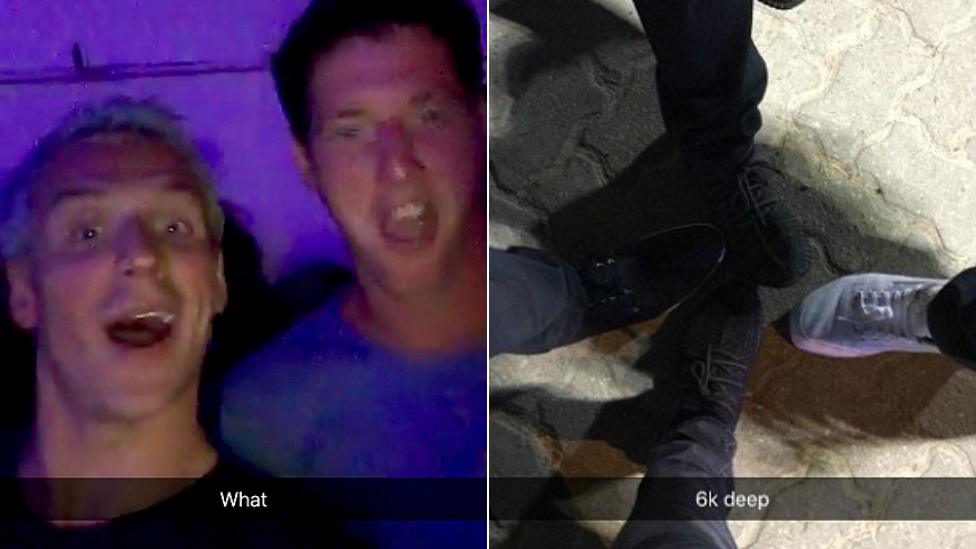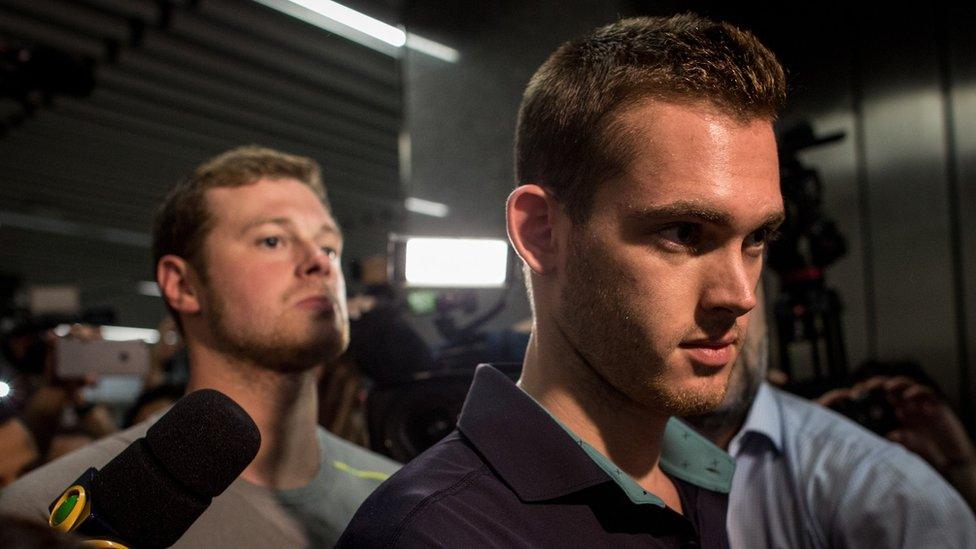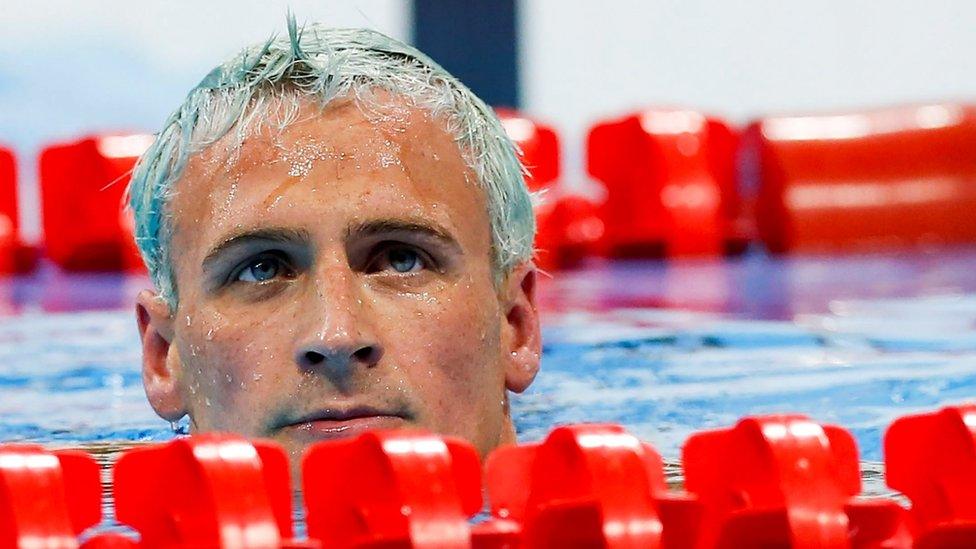US swimmers case in Rio: What we know
- Published
A lawyer for Gunnar Bentz and Jack Conger said the pair were "shaken"
The CCTV footage seems routine. Four swimmers, fresh from celebrating their final competitions, return to the Olympic village in the early hours of the morning. They pass through the metal detector, taking items from their pockets - possibly wallets and phones - as they go. They appear relaxed.
But this short, unremarkable clip is now at the centre of an Olympic mystery and a police investigation because, according to the four US Olympic gold medal winners - Ryan Lochte, Jimmy Feigen, Jack Conger, and Gunnar Bentz - they had just been robbed at gunpoint at a petrol station.
It seemed like a simple story at first, but the athletes' account has now been contradicted by Rio police who say they have evidence that the men were involved in a fight at the petrol station after one of them vandalised a toilet door, and that they invented the robbery to cover it up.
Mr Lochte has been back in the US since Tuesday. Mr Conger and Mr Bentz were allowed to fly home on Thursday - a day after they were pulled off a plane to be questioned. Mr Feigen is now also returning home after agreeing to donate nearly $11,000 (£8,300) to a Brazilian charity.
And on Friday Mr Lochte apologised for his actions, and "for not being more careful and candid".
Since the story began on Sunday morning, 14 August, it has taken more than a few twists and turns.
The story emerges
On Sunday afternoon, six or so hours after the swimmers returned to the village, USA Today and Fox Sports Australia, citing Mr Lochte's mother, reported that four US athletes had been robbed on their way back from partying at Club France, part of the French hospitality area.
According to the reports, the swimmers got in a taxi for the Olympic village at about 04:00. Speaking to NBC News hours after the story hit the headlines, Mr Lochte gave a vivid account of what happened next:
"We got pulled over, in the taxi, and these guys came out with a badge, a police badge, no lights, no nothing, just a police badge and they pulled us over. They pulled out their guns, they told the other swimmers to get down on the ground. They got down on the ground. I refused, I was like, 'We didn't do anything wrong, so I'm not getting down on the ground.'
"And then the guy pulled out his gun, he cocked it, put it to my forehead and he said: 'Get down,' and I put my hands up, I was like 'Whatever.' He took our money, he took my wallet. He left my cell phone, he left my credentials."

Ryan Lochte posted Snapchat videos during the night showing the group partying
Mark Adams, a spokesman for the International Olympic Committee, told the press that the swimmers' account was "absolutely not true".
Then Mr Adams retracted his statement, saying he received incorrect information from the US Olympic Committee (USOC). The USOC put out a statement confirming that the swimmers were robbed.
The swimmers did not report the incident to police or to the USOC, and officers in Rio only got involved after seeing it reported on TV.
Police struggle to find evidence
By this point, two of the four had made public statements about the robbery.
Posting on Instagram, Mr Lochte wrote: "While it is true that my teammates and I were the victims of a robbery early Sunday morning, what is most important is that we are safe and unharmed."
Mr Bentz tweeted: "We are all safe. Thank you for your love and support. P.S. the gold medal is safe."
At this point, a police official told the Associated Press that Mr Lochte and Mr Feigen were unable to give basic details and are contradicting each other's stories.

Jack Conger (L) and Gunnar Bentz were pulled off their flight and interviewed at Rio airport
Mr Lochte and Mr Feigen had told police they left Club France at about 04:00 and took a taxi from a nearby petrol station. According to their account, they went straight from the club to the village - a journey of 30 to 40 minutes - with the robbery happening along the way.
But the CCTV footage clocked the swimmers returning to the village at 06:56, nearly three hours after they left the club.
Mr Lochte then slightly altered his account, telling NBC on Wednesday, external that the taxi was not pulled over but they were robbed while making a stop at a petrol station. And he said the gun was not pointed directly at his forehead.
Police tried and failed to find the taxi driver, or any other witnesses.
A Brazilian judge was sufficiently concerned that she ordered Mr Lochte and Mr Feigen to surrender their passports. But when police turned up at the Olympic village on Wednesday the four men had already moved out, and Mr Lochte had already landed in the US.
Mr Conger and Mr Bentz were then tracked down to a flight about to leave Rio. They were pulled off the plane for questioning. It later emerged that Mr Feigen was still in Brazil., external
Robbery claim denied
On Thursday, police sources in Rio told the BBC that the swimmers invented the story about the robbery. They said that the four athletes arrived by taxi at a petrol station in Barra da Tijuca, 16km from the Olympic Park, where one of the athletes broke down a toilet door.
The petrol station attendants asked the Americans to pay for the damage, according to the police, and a verbal dispute ensued.
The athletes then reportedly paid the staff and left before police arrived. Police said they have identified the recording of the phone call from the gas station and the security guard at the station had given a statement to police.
Rio's civil police head Fernando Veloso later on Thursday emphatically denied a robbery took place. "They were not victims of the crimes they claimed," he said. He did concede that one of the security guards pointed his gun at the swimmers.
The people of Rio were unhappy to see the reputation of their city damaged, Mr Veloso said, adding that the city was owed an apology.
The USOC has apologised for what it called the unacceptable behaviour of the swimmers.

Story inconsistencies
The Video: Surveillance footage taken as the team returned to Olympic village appears to show the swimmers passing valuables through a metal detector, despite telling police that items had been stolen.
The Robbers: Jimmy Feigen said several robbers were there but that only one had a gun, however Ryan Lochte told Brazilian authorities that there was only one robber who targeted the group.
The Gun: Mr Lochte initially told US media that the robber had placed a cocked pistol against his forehead, but in a later interview said that gun had only been pointed in his general vicinity.
The Encounter: Mr Lochte first claimed that their taxi was pulled over, but later said that the car was already stationary at a petrol station when the robber approached.
- Published15 August 2016
